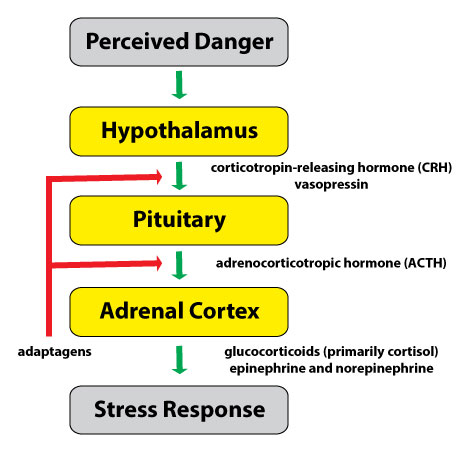Stay Informed
Popular Articles
- Hiatal Hernia: Hidden Cause of Chronic Illness
- Small Intestinal Bacterial Overgrowth (SIBO)
- Applied Lymphology: Unlocking the Secret to Pain Relief
- An Introduction to Constitutional Iridology
- The Low Down on Liver Detoxification
- An Energetic and Emotional Approach to Cancer
- Fat Facts
- Marrow in the Bones
- Blood Type and Nutrition
- Cardiac Herbs: Beyond Hawthorn
Quick Search
The School of Modern Herbal Medicine




Natural Remedies for Stress
- 2/9/2008
- Categorized in: Specific Health Problems
 I don't want to spend a lot of time here discussing supplements for stress. However, I do need to cover the basics.
I don't want to spend a lot of time here discussing supplements for stress. However, I do need to cover the basics.
Most herbs that help the body relax are going to inhibit the sympathetic nervous system and/or stimulate the parasympathetic nervous system. A few good single herbs to consider are chamomile, blue vervain, scullcap, hops and passionflower. Scullcap is a very good choice if your nerves feel frazzled and you feel completely exhausted. Chamomile is good if you feel irritable and peevish. Blue vervain is great for people who drive themselves fanatically and carry a lot of tension in their shoulders. Passionflower helps calm excessive mind chatter and both hops and passionflower can help you relax for a better night's sleep.
These are key ingredients in Relaxing Nervine Formulas, a list of which can be found in our book Modern Herbal Medicine. A Relaxing Nervine Formula is a good thing to take at the end of a long, hard, stress-filled day. They work better than a “night-cap” and are a lot healthier, too.
Cortisol is an important hormone in this stress cascade. It is one of the glucocorticoids produced by the adrenals which help to regulate blood sugar. It also dampens inflammation. So, in one way it is part of the healing process. Too little cortisol and inflammation runs rampant. Too much and the immune system is depressed. Too much cortisol and you also gain weight, which is what happened to me when I went through that seven-year period of intense stress. When cortisol levels are high, as in acutely stressful conditions where you feel “all wound up,” Adaptagens reduce cortisol output from the adrenals.
Adaptagens
 So, for really chronic stress, however, adaptagens can help. The figure on the left shows the cascade of stress hormones that occurs when we perceive danger. The hypothalamus signals the pituitary, which signals the adrenals to release stress hormones. There is a feedback loop that signals the pituitary and hypothalamus that enough stress hormones have been released and the cascade shuts down.
So, for really chronic stress, however, adaptagens can help. The figure on the left shows the cascade of stress hormones that occurs when we perceive danger. The hypothalamus signals the pituitary, which signals the adrenals to release stress hormones. There is a feedback loop that signals the pituitary and hypothalamus that enough stress hormones have been released and the cascade shuts down.
The problem comes when we are under a long term stress situation so we never have time to calm down. Each new stressful thought provokes another cascade and our stress hormone level keeps ramping up.
Adaptagens work by entering the feedback loop and calming down the signals from the hypothalamus and pituitary. This reduces the output of stress hormones and the base-line stress level. Some adaptagens are also nervines, so they also help a person relax. This makes adaptagens very helpful when we're under a lot of stress. They can help keep our immune system working better, help us think more clearly and sleep better, and otherwise mitigate the effects of stress.
Eleuthero Root was the first one discovered. I've taken it off and on during periods of stress and found it to be very helpful. It's a pretty good all round adaptagen for just about anyone. As we get past 50, Korean or American ginseng may also be good adaptagens to consider as they can also help to balance out sex hormones (especially in males). For women, ashwaganda is often a good choice as it helps the thyroid as well as balancing female hormones.
Schinzandra is another adaptagen I've used. It also has hepatoprotective effects if you're being exposed to toxins and chemicals. Rhodiolia is another, but is a bit too astringent for my liking. Other adaptagens include licorice root, he shou wu, astragalus, cordyceps, holy basil and suma. Try looking for a good Adaptagen Formula such as Nature's Sunshine's Nervous Fatigue Formula, Herbalist and Alchemist's Ginseng/Schisandra Compound or Gaia Herb's Stress Response. A more complete list can be found in Modern Herbal Medicine. If you feel like you're under a lot of stress, I highly recommend you try one.
When the stress has really gotten to you, and your adrenals are beginning to get exhausted, you'll find a good Adrenal Tonic Formula to be indispensable. You may even need an Adrenal Glandular. The first signs of “burn-out” are disturbed dreams and restless sleep. Later, you start to feel tired during the day, but toss and turn all night long, waking up frequently. You'll feel confused, moody, lose your memory and feel “unable to cope.” There is also a list of these formulas in Modern Herbal Medicine.
Is It All In Your Mind?
 A few years ago, when my son and I went to the Whole Foods Expo in Anaheim, California, we went a day early and went to Disneyland and the new California Adventure park. Space Mountain, Tower of Terror, etc. and we had a blast. What's interesting is that all these amusement park rides are causing the release of the same hormones we associate with stress. Yet, it was fun!
A few years ago, when my son and I went to the Whole Foods Expo in Anaheim, California, we went a day early and went to Disneyland and the new California Adventure park. Space Mountain, Tower of Terror, etc. and we had a blast. What's interesting is that all these amusement park rides are causing the release of the same hormones we associate with stress. Yet, it was fun!
The same is true for rock climbing, hang gliding, surfing, riding motorcycles and so forth. People do this because it gets “stress” hormones pumping in their bodies and they love it.
It's also interesting that the body reacts the same way to an imagined experience as it does to a real experience. The same chemicals are released. So, when we watch an action-adventure or horror film we get the same chemical response as when we ride a roller coaster. In both cases we're “flirting” with danger. On the roller coaster, our senses tell us we're in “danger” but we know we're really not, and we have the same experience in the movie theater.
So, it's quite obvious that people can actually enjoy the physiological effects of stress. That's because stress hormones can help us feel good. They give us energy and can even create a kind of internal “high.” If we don't produce enough of them, then we feel tired and depressed. So, as with any other aspect of health, balance is the key.
But, let's go back to that perception thing. Remember that an imaginary experience can cause the same physical stress response as a real experience. That's why what is stressful for one person can be fun for another. It really depends on the attitude and perceptions of the person.
My gardening is hard work, but it's relaxing to me. It reduces my stress level. Now, if I hated the outdoors and hated getting dirty and I was forced to do gardening, I would have an entirely different reaction wouldn't I? So, it isn't just the activity or event itself that causes stress, it's our perception of it. Anxiety and excitement create the basically the same chemical reactions in the body, but one is perceived as enjoyable and the other as negative.
So, what really creates the reaction we call stress is when we perceive that something is “bad” and we mentally resist it. Taking the same situation and thinking, “Okay, I don't like this, but I'm going to make the best of it,” takes most of the stress out of it.
Furthermore, you'll note that we don't put “stress” as a root cause of disease on the Disease Tree model. Instead, we say, “unresolved mental and emotional stress.” It's the stressful events and situations that we are unable to resolve and let go of that really cause us to get sick. It's the stuff that happened 10 years ago that we still get upset about when we think about it.
So, if we change our perception of something we can actually take a lot of the stress out of it. For example, we could fuss and fume about a traffic jam, or we could decide, “hey, this is a great time to relax” and put on some nice music or a motivational program. In other words, stuff isn't just happening to us, we are assigning meaning to the stuff that is happening to us. And, if we assign a negative meaning to any event in our life, it will cause us stress. If we chose (and we can chose) to see the event in a different light, the stress can be defused.
My father in his 50s and 60s could outwork me with I was in my teens and early 20s. In fact, he could outwork most men who were 20-30 years younger than he was. He shared with me his secret. He said he stayed relaxed, but just picked up the pace. He said that when you tense up, you get tired faster. You can read more about this in my article Relax Your Way to Greater Health (and Energy).
So, when faced with a stressful event, we have a choice. We can fuss, fume, stew and otherwise resist what is happening, OR we can take a deep breath, allow ourselves to relax and just take things one step at a time. Doing the former will give us an ulcer or worse, doing the later will keep our mind clear, our body primed for action, and have us doing our best to resolve the situation. The choice is ours.
In fact, when I practice what my now deceased chiropractor Michael Brenay said, and practice having a “gratitude attitude,” stressful situations rapidly diminish into manageable situations. When one is grateful, it dissolves resistance, and that dissolves tension, which dissipates stress. And that keeps us healthy, physically and emotionally. So, as Dr. Brenay would say, “Glide down the glory road of life with a gratitude attitude.” You can read more about that in my article Apples Up! Timeless Advice on Creating Happiness in Life.
